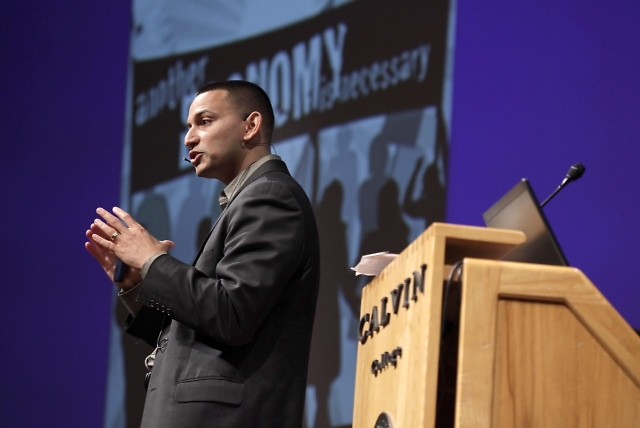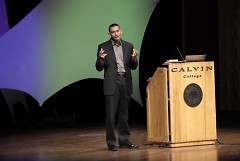Social justice has been a theme highlighted throughout this year's Calvin College January Series, not least by Monday's speaker Adam Taylor, an emerging voice among a new generation of Christian activists. Having worked in the Carr Center for Human Rights at his alma mater Harvard, he went on to co-found Global Justice, an educational organization mobilizing students to address global human rights. Later becoming Senior Political Director at Sojourners, where he focused on constituency growth and advocacy, he also completed a fellowship in President Obama's White House Cabinet of Public Affairs and Public Engagement. He currently serves as Vice President of Advocacy for World Vision, a Christian humanitarian nonprofit addressing issues of poverty and injustice in almost 100 nations worldwide. An author as well, 2010 saw the publication of his book Mobilizing Hope: Faith-Inspired Activism for a Post-Civil Rights Generation.
Giving his address on Martin Luther King, Jr. Day, Taylor used the date as a backdrop for his talk, entitled "Radical Discipleship and Transformed Non-Conformism." That theme was inspired by an MLK, Jr. quote: "The saving of our world from pending doom will come not through the complacent adjustment of the conforming majority, but through the creative maladjustment of a non-conforming minority." He went on to revisit vital elements of the 1960's Civil Rights Movement, citing sit-ins, Freedom Rides, and Student Non-Violent Coordinating Committee actions as historic successes in a seminal era of the justice movement.
But while honoring King's legacy, Taylor noted that important ideals in the leader's life work are overlooked in the glare of the 'brand' since grown around the civil rights icon. King's dedication to labor unions, an impassioned anti-war stance, and a call for criminal justice reform are causes often underplayed in modern institutional remembrances. Taylor reminded the audience that racism takes many forms, explaining that global traffic in human slavery far exceeds levels known decades ago; relative poverty levels here and abroad have grown; and the American penal system has become an increasingly inescapable trap for huge numbers of minorities. For these reasons and more, he argued that activism must be re-invented for a modern generation of justice advocates.
What then is the way forward for such a generation? To illuminate that path, Taylor first pointed out what he sees as the most glaring of several false choices in Christianity--the choice between charity and justice; between service and activism. He stressed the vital importance of a two-fold approach for Christian humanitarians: service work balanced with an ongoing fight for systemic reform. It isn't enough, he said, to attend to the needy through charity alone. Deeper structural changes must be addressed with just as much passion and intelligence. While charity meets the short-term needs of the disenfranchised, embedded economic, educational, and social wrongs must also be confronted as the deeper causes of need. Faith, he declared, is hollow without justice.
In that vein, the speaker cited a Biblical basis for social justice struggles. He delineated a number of different interpretations of Jesus' life and teachings, asserting that elements of all of them must be combined into a recognition of what he calls the 'Holistic Jesus.' Taylor believes this broadened understanding of Christ's message is the foundation for a worldly-engaged faith. He explains, "Faith cannot be limited to fire insurance from Hell."
Taylor feels Generation X and beyond have gotten a bad rap as being apathetic and disengaged. He insists statistics show record numbers of these age groups engaged in community service. Pragmatic solidarity and hopeful activism on the part of these demographics have led the day in crucial battles for equity around the world, including South Africa and other third-world regions. But he says an entrenched American emphasis on rugged individualism over the Golden Rule has dampened what could be far greater collective action among this nation's youth. He laid out antidotes to this problem, including innovations in public service policy, expanded educational opportunities, the forgiveness of crippling personal debt, and more widely, a gradual evolution from nationalism toward a global identity.
Ultimately, he says, today's activists must move beyond protest into political engagement, consumer action, and a wider planetary consciousness. For that segment of young activists who call themselves faith-inspired, Taylor issued a call to re-envision what personal faith means on the ground, translating it into lasting change with new tools and a perspective broader than the worldview their forebears acted from.
The Rapidian, a program of the 501(c)3 nonprofit Community Media Center, relies on the community’s support to help cover the cost of training reporters and publishing content.
We need your help.
If each of our readers and content creators who values this community platform help support its creation and maintenance, The Rapidian can continue to educate and facilitate a conversation around issues for years to come.
Please support The Rapidian and make a contribution today.



